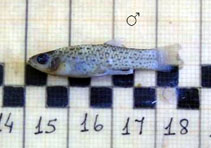| Family: |
Anablepidae (Four-eyed fishes, onesided livebearers & white-eye), subfamily: Anablepinae |
| Max. size: |
7.66 cm SL (male/unsexed); max.weight: 13.3 g |
| Environment: |
benthopelagic; freshwater; brackish |
| Distribution: |
South America: Argentina, Uruguay and Brazil. |
| Diagnosis: |
This species is distinguished from all its congeners, except J. darwini, J. onca, J. sanctaecatarinae, J. maculata, J. luxata, by having a colour pattern of round or dash-shaped marks forming multiple rows; differs from J. onca and J. sanctaecatarinae by having the swelling between the urogenital opening and the base of the anal fin of females (vs. no swelling); differs from J. onca by not having a distinct dorsal convex expansion at subdistal segments of the right hemitrich of anal-fin ray six of adult males (vs. presence); differs from J. maculata with left and right halves of anal-fin ray six laterally paired in adult males (vs. not laterally paired); differs from J. luxata with medial processes of left and right pelvic bones overlapping at the ventral midline (vs. reduced processes not overlapping); differs from J. darwini by the dorsal postcleithrum being less than twice as deep as wide (vs. three times deeper than wide) and the female colour pattern in the half of the caudal peduncle with rows of aligned spots forming lines (vs. segmented in unaligned spots) (Ref. 128887). |
| Biology: |
Found in rivers and lagoons of coastal basins, inhabiting both brackish and freshwater (Ref. 128887); along with the livebearing Cnesterodon decemmaculatus in waters with heavy algal growth. Genital opening in the female asymmetrical. Viviparous (Ref. 26130), |
| IUCN Red List Status: |
Least Concern (LC); Date assessed: 27 April 2020 Ref. (130435)
|
| Threat to humans: |
harmless |
Source and more info: www.fishbase.org. For personal, classroom, and other internal use only. Not for publication.
